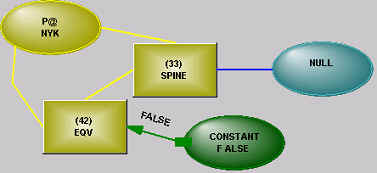Does Godel Tell Us Anything We Need To Know
Godel showed that even quite simple systems built on axioms would soon run into a problem of self reference, where
P is a statement
The statement P says that P is False or P is unprovable
which leads one to the dilemma that P cannot be true, but also cannot be false.
For a network structure, where
P begin
P EQV False
end P
arises pretty quickly, this is hardly a surprise. We have had a logical state of UKE (Unknowable) from the beginning, because many things turn out to be unknowable, and a reasoning system has to realise this and move on.
Godel focused on a simple language (functional arithmetic) and converted statements into numbers (a conversion with dubious validity). He wanted to use a common formalism, but then smeared existence, logical state and numerical value – we keep them separate for the very good reason that they are orthogonal properties. There is inadequate state information if its numerical value is the only existential and logical marker for a numeric variable. Which means that Godel's analysis has to be wrong in principle, although the conclusion - that even simple axiomatic systems need more than two states, can be right.
People assume that what Godel said translates into something more, an upper bound on what is possible in any language. He didn’t attempt this, and indeed said that what he described was not intended as the mathematical basis for the syntax of a language.
There are several reasons why we can ignore what Godel showed.
Firstly, he showed that True and False are not adequate states to describe the world – we are not saying they are, and more particularly, we are keeping logical state separate from numerical value and existential state – a separation which would hobble his analysis (it wouldn’t work, and for a similar reason that Turing’s analysis wouldn’t work with an interrupt).
Secondly, he assumed the statements in the language were precisely what the symbols said, no more and no less. But language need not be a direct translation of structures – given the linear form of text, it would be surprising if it were. The way we combine multiple pluses appearing in the text into one operator is one example of many, where we are patching around the limitations of the linear form to enable easier inferencing, but looking at the text you wouldn't see that. That is, structure to text to structure is not all it seems – it is much more.
Thirdly, Godel's analysis concentrated on the symbols of a restricted mathematical language (functional arithmetic), known a priori, and the limits of what they could express. There was no conception of a continually evolving language.
But if Godel's analysis, at around the same time as Turing's, showed that at least three states were required to describe a logical system, why were people happy to accept that one state - the halted state - could even be conceived of to mechanically solve all problems. Many people seem to operate with watertight compartments in their heads.
Humans are well aware of the limitations of their language
"We know more than we can tell."
"I was at a loss for words."
There is a line in Shakespeare’s King Lear, when Cordelia is asked to express her affection for her father. She says
"I cannot heave my heart into my mouth."
By saying she could not use words to express her affection, she used words to say how strong it was.
There is another line in King Lear - "whose low sound reverbs no hollowness" - implying that little said, and all true, means more than much said, some of it false.
But humans describe complex conditions for which the language seems ill suited by telling a story. Homer's Iliad for example. It is hard to say what honour, obligation, fate are, because they are processes, but by Homer telling a story, the reader can imagine themselves in the story, compare the decisions they might have made with the decisions of the characters, examine the consequences, see where honour leads, and be changed by the story, although at no point did Homer directly address the internal states of the reader, nor could he.
The writer has created a complex structure, with transitions resulting from processes. The reader acquires the structure, and learns from it in a way that single words could not do. New concepts enter the language - Achilles, Helen of Troy - with complex meanings that can be used by a writer and reader in another context.
The reader also infers much from why the writer had chosen to say some particular thing, by the sequence of what is said, and by what is left unsaid in a particular situation.
Godel's analysis ignored the complexity of the internal states of the source and sink of language, the implier and the inferencer, and for that reason is irrelevant to what we are about.
We are attempting to build something which can build structure as a result of what it reads, and by doing so will enable the expressiveness of human language to be used against it.
Of course there are limitations on language – a world class tennis player cannot possibly tell you all they do as they follow the flight of the ball, run across court, then hit a backhand winner – most of their skill was not acquired at, and is not accessible at, a conscious level. But someone can describe a tennis match, and if you have ever hit a tennis ball, you can imagine the rest.